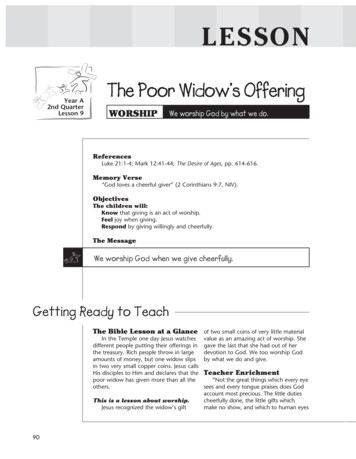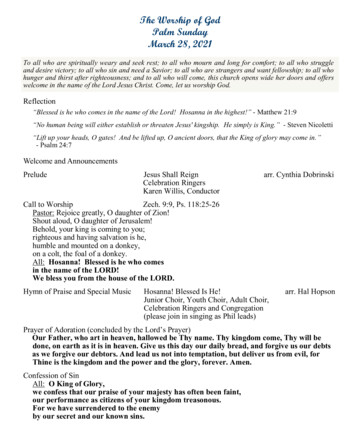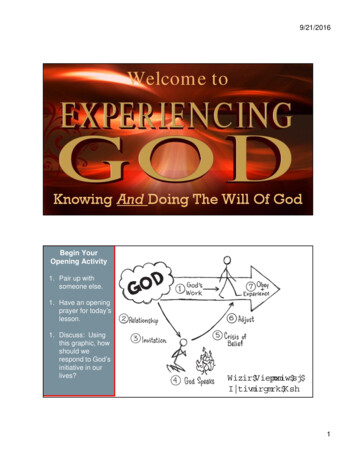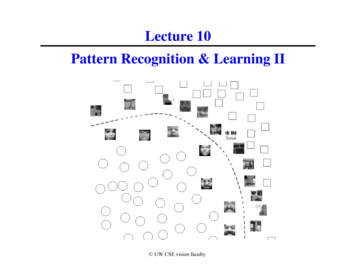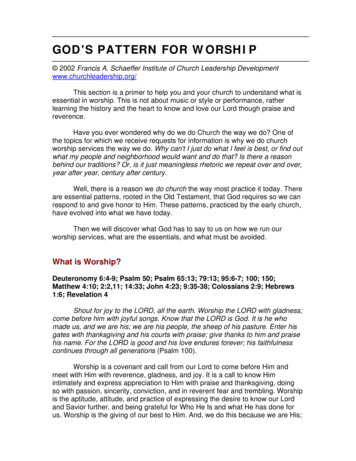
Transcription
GOD'S PATTERN FOR WORSHIP 2002 Francis A. Schaeffer Institute of Church Leadership Developmentwww.churchleadership.org/This section is a primer to help you and your church to understand what isessential in worship. This is not about music or style or performance, ratherlearning the history and the heart to know and love our Lord though praise andreverence.Have you ever wondered why do we do Church the way we do? One ofthe topics for which we receive requests for information is why we do churchworship services the way we do. Why can't I just do what I feel is best, or find outwhat my people and neighborhood would want and do that? Is there a reasonbehind our traditions? Or, is it just meaningless rhetoric we repeat over and over,year after year, century after century.Well, there is a reason we do church the way most practice it today. Thereare essential patterns, rooted in the Old Testament, that God requires so we canrespond to and give honor to Him. These patterns, practiced by the early church,have evolved into what we have today.Then we will discover what God has to say to us on how we run ourworship services, what are the essentials, and what must be avoided.What is Worship? What is Worship, Worship, joy, gladness, Worship the,Deuteronomy 6:4-9; Psalm 50; Psalm 65:13; 79:13; 95:6-7; 100; 150;Matthew 4:10; 2:2,11; 14:33; John 4:23; 9:35-38; Colossians 2:9; Hebrews1:6; Revelation 4Shout for joy to the LORD, all the earth. Worship the LORD with gladness;come before him with joyful songs. Know that the LORD is God. It is he whomade us, and we are his; we are his people, the sheep of his pasture. Enter hisgates with thanksgiving and his courts with praise; give thanks to him and praisehis name. For the LORD is good and his love endures forever; his faithfulnesscontinues through all generations (Psalm 100).Worship is a covenant and call from our Lord to come before Him andmeet with Him with reverence, gladness, and joy. It is a call to know Himintimately and express appreciation to Him with praise and thanksgiving, doingso with passion, sincerity, conviction, and in reverent fear and trembling. Worshipis the aptitude, attitude, and practice of expressing the desire to know our Lordand Savior further, and being grateful for Who He Is and what He has done forus. Worship is the giving of our best to Him. And, we do this because we are His;
we give Him our heart that is already His. He has given His best to us already; inaddition, we are enveloped into His eternal love and care for pure and usefulpurposes.Psalm 100 gives us a general overview of what worship is. First, thisPsalm calls us to worship, summoning us to appear before and meet with God. Inso doing, we recognize who He is, as He is the Audience, Object, and Focus ofour worship. The Psalm then tells us that we are to be passionate about Him.This is not an emotional response, although it can be; it is more of a commitmentto follow Him with all of our heart, soul, and mind. Our response is our duty froma heart He made in us. It is also a responsibility and a delight; we do it evenwhen we do not feel like it because we do it to please Him and we find joy in that.Worship is giving our respect to Christ and expressing our joy for Who He is. Weare the people whom He has made and redeemed so that as individuals, we canworship and honor Him in our hearts and attitudes, then come togethercollectively to praise and honor Him as Lord of our lives.The next thing this Psalm tells us is to realize that worship has a real,effectual purpose to discover and glorify God as LORD over all, including ourdaily lives, even when we do not see it. He is the center and reason for ourworship; He is the principle center of attention, the focal point, the centrality, andthe Supreme One we reference, acknowledge, and glorify. Worship is ouropportunity to commune with Him, to be in union with Him who is the Lord andCreator of all, to come into His presence at His throne room and allow our heartsto be broken so we can give Him our best, our primary attention, and ourforemost adoration. And, we do this with exuberance; that is, we bring Him ourexcitement along with our reverence. It is about His greatness, holiness, andsovereignty and our realization, with trembling and telling Him so, of Hisawesome nature. We must see His holiness in contrast to our sin, His love for us,and our unworthiness to receive it, so our fear and joy can be shown to Him.Oh, the incredible assurance, the inconceivable hope, His offering to us(who are unworthy yet we receive it anyway) of His incomprehensible love andHis incalculable faithfulness! We can know for certain, regardless of what wehave seen or experienced, that our God is good. He is compassionate, and Heloves us. He is kind, He cares, He does not condemn us when we deserve it, andHe is Worthy beyond measure to receive our praise. Then, we can convey ourearnest gratitude to Him, all in deep, real, authentic joy. Worship is joy becausewe are in Him and for Him, and here our joy is exuberance (Psalm 24; Hab. 2:20;Matt. 4:10; 6:6; Rom. 8).Do You Know What Worship Is?When the average Christian thinks about worship, he tends to think aboutmusic or how a service is planed out. Perhaps a favorite hymn comes to mind ora praise song that captivated him or her in some moving response. This is sad so
to speak, for music, as wonderful and impacting as it can be, is not worship. It isan expression of worship, but it is not worship. Worship is the attitude of ourhearts in gratefulness for who our Lord Jesus Christ is and what He has done foryou and me, and our commitment to express it with an attitude of gratitude in ourdaily lives. And, of course, we can use music to do this; however, true worship ismeeting with Him, our heart pouring out to His. In application, worship is also theentirety of the church worship service; the reciting of creeds, liturgy, and theadministration of the sacraments such as the Lord's Supper, the message, andprayer.The problem many of us face in understanding and doing worship is wemiss the main point. We get so caught up in the mechanics and formalpreparations that we miss the reason for our coming together for worship. We, aspastors and leaders, seek to please our congregation with the latest movementsin music worship and PowerPoint selections, so we center our worship onpleasing people, captivated by minor things and forgetting whom the mainaudience is. We place ourselves as the center reason for worship in our wantsand desires, and forget its purpose.Others think that worship is boring, or dread it, and thus neglect it. Do youthink worship is boring? Do you dread dragging the kids to church with all thehassles that go with it? “For what?” you say. Perhaps, we become hard ordisappointed with God and no longer feel like worshiping Him. Conceivably, wemay only be interested in emotional reactions how we feel and what we get sothere is no real, active, heartfelt participation on our part. Perhaps, the songselection and the melodic, correct, and favored instruments and harmony are notthe problem; rather, it is our attitude and limited knowledge of what we are to doand be in worship.There is no place in Scripture where someone encounters God and says itis not relevant or he or she is bored. If we become bored in our church, possiblyit is our reverence and attitude that is wrong; perhaps our passion hasdisappeared. Worship becomes boring or a hassle because we want to bepleased, or because we yearn for whatever the latest happenings are and we arenot receiving them. But, we have to realize that boredom comes from a heart thatis detached from the focus and object of the worship, which is Christ. We are notpaying attention to the One we should. Our boredom is a personal and spiritualproblem of a lost focus, or of carelessness or laziness. It is like an addiction tothe latest fad and what moves us rather than what we are to bring. We mustreengage our hearts and minds, be renewed to Christ, and be satisfied by whatHe has done in us. When we worship, we are to respond to Him and only to Him.It comes down to our surrendering our will over to His, so He is more and we aresubmitted to Him (Isaiah 59:16; Psalm 34:8; 63:1-4; John 3:30; Rom. 12).Yes, we can and should strive to make our worship services moreengaging, more excellent, and be our best for His highest. But, it is not about
how we do it; it is about why we do it. Good worship is not about the “right things”as we see it; it is about being right in Christ and expressing our gratitude to Him.Our hearts need to be engaged in bringing our joy and gladness to and for Himas the object of our worship. Our desire needs to be satisfied by being in Hispresence, not by the melodies, the tunes, or the forms and procedures. We comeinto the Lord's presence with joy and exuberance from a heart of gratitude notbecause of the pleasing sounds of the worship band or organ, or getting what wewant from it. Never let worship be just an emotional response to the music, howthe service is structured, or what we are used to; if this is so, you and yourchurch have missed the point by a very large degree!The bottom line of effectual, true worship of our Lord Jesus Christ asSavior and Lord comes down to being God—centered and not self—centered, asin only interested in meeting the needs of those who come and not Who we areto proclaim. Worship is more a matter of substance than of form; authenticworship will spill out to all parts of our lives. It helps us focus on Christ and thenembrace what we are called to do in life. Worship is not just what we do in thechurch; rather, it is what we do in our Christian lives. We then allow that attitudeto climax in our worship services as we seek Him with our gratitude, delight, andaffection.Real worship is about Jesus as the Giver and the Receiver, knowing andpracticing Him, not us. We are not to be selfish or self-centered in how weapproach God. We are not to focus on what concerns or satisfies us; rather, ourfocus should be on how we come to Him and meet with Him—all to please Him.It has been said so well by St. Francis: it is in giving that we receive. Church andworship are not about what is offered to us or what we can get out of it; they areabout how we offer ourselves to God. If we understand this, we please and honorour Lord and build a healthy, vibrant, Christ—centered church. If we do not getthis, we play into the consumer mentality of current church trends and thinkingthat disrespects God and greatly miss the point of who and why we areChristians.Worship Means We Are to Glorify Our LordAsk and it will be given to you; seek and you will find; knock and the doorwill be opened to you. For everyone who asks receives; he who seeks finds; andto him who knocks, the door will be opened. (Matthew 7:7-8)I write these things to you who believe in the name of the Son of God sothat you may know that you have eternal life. This is the confidence we have inapproaching God: that if we ask anything according to his will, he hears us. And ifwe know that he hears us—whatever we ask—we know that we have what weasked of him. (1 John 5:13-15)Our chief purpose in life is to give Christ glory; this is what these passages
are all about. This is proclaimed in Scripture (Psalm 73:25-28; 1 Cor. 10:31;Rom. 11:36), in our confessions of faith, and must be so in the practice of ourfaith. Again, it is not about us, it is about Him! To worship Christ is to identify usin His purpose and will, not in ours. The key component, which is overlooked bysome for dramatic effect and selfish inclinations, is who the focal point is. It mustnot be very convenient for some I guess, and when the church does not yield tothis strong premise, we will fall to our own schemes and thus fail with His call.We may take pleasure in false emotional and sociological phenomena, but todeny the Glory to Christ is a very dangerous move that will turn and bite us hardlater.It is interesting to note that many false teachers use these verses out oftheir context to proclaim that God is a divine bellhop who delivers to us ourwhims and desires—that we seek Him to please ourselves and get what wewant. Nothing could be further from the truth. There is no guarantee that God willgive us anything, and we certainly do not deserve anything. Out of His grace willcome splendors and treasures for us in His time, perhaps in this life, but certainlyin the life to come. It is this same perverted thinking that twists what worship is,falsifies who Christ is, and misrepresents how we are to approach Him.What we need to ask ourselves is if the glory of God is in our mindsetwhen we sit in our churches and begin to worship? If not, why not? To begin ourworship, our minds need to be focused on Him, with the will and desire to glorifyChrist. Perhaps we should ask ourselves, what enchants me? What is mypleasure? Where is my treasure? Where is my gain? These questions will showour character and where we receive our drive and thinking. These are theguidelines that motivate our designs and decisions, and how we treat our Lordand one another. This is also how collectively, we as a body of believers will treatour neighbors and one another. Having a mindset of glorifying Christ will affect allwe do in life. It will enhance our relationships, center our church, and cause us tobe more fruitful in what He has for us.Remember that the essential element in worship is that all who proclaimGod as Lord must also be devoted to Him. That is, we must love Him, we respectHim, and we fear (as in awe) and reverence Him. We are to worship Him andonly Him in glory, and what He has done in deeds. We can take comfort andassurance that the worship we have toward the Father does not fall on deaf ears.We are meeting with our Father and not a tyrant. We are to seek His presence,apply it to ourselves, and then to others. Then, the blessings will abound and wecan be the church we should be a heartfelt, God-exalting church that reallyworships (Ex. 3:14-15; 15:11; Isa. 6:3; 41:4; John 20:28; Rev. 1:4-6).Worship Means We Are to Fear our LordWe are to “Fear God.” This means we are to reverence God as our Lord,not as an afterthought, when it is convenient or to regard as just as a “pal.” This
is a principle aspect of worship we must take seriously and heed. We are tocome before God in this way, along with humbleness (1 Pet. 5:6). We bring Himour endearment and respect with more meaning, power, and intensity. This is thereverence and awe of God before His holiness that He seeks (Job 28:28; Prov.1:7; 3:5; 8:13; 9:10; 16:6; 31:30; Psalm 2:11; 34:11; 111:10; Isa. 12:6; Eccl. 12:13; Mal. 1:14; Matt. 10: 27-33; Rom. 2:11; James 2:1). It does not mean we areafraid of Him; rather, we are fearful of His wrath and in awe of His presence(Matt. 11:28; Rom. 3).The book of Proverbs states that the fear of God is the foundation oflearning and growing, as Jesus confirmed in Matthew 10:27—33, making thisprecept clear. Fear helps us focus on Him, realizing His awesome holiness andour unworthiness. It enables us to grow away from our personal doubts anddistractions into the embrace of His wonder. Then, we can bring Him a respectfulattitude, one of wonder and admiration, and there is nothing that can hold usback from proclaiming His praise. Fear, in the context of the Matthew passage,helps us see how He loves us too. When we understand that we are precious inHis sight, and that His deep love for us is true and real, we will have no need todrag along our anchors of dread and apprehension. We can let go and allow Himto reign and be Lord over us as our loving Father. We have to learn how muchHe indeed cares for us so we can trust Him even more to take us beyond whatholds us back in life. In this way we can go deeper with Him, be able to use thegifts He brings, and take advantage of the opportunities that come. This fear ofGod will so infuse us with love that we will passionately desire to proclaim Himfrom the roof and mountaintops, as in Praise God!Fear is how we are to come before God. Our word for “respect” is a frailcomparison to its Hebrew and Greek equivalent. Thus, “fear” is used instead of“respect” or “reverence” in most English translations. In Proverbs and otherJewish wisdom literature, the fear of God is a foundational theme that we in theevangelical world have either forgotten or replaced with platitudes and ideas thatfail in comparison. Too many of us have forsaken this necessity for true worship.However, realizing that the fear of the LORD is also the loving reverence for Godthat contains our love for Him may help us understand. This helps us embraceour submission to His Lordship of our lives, and causes us to keep His preceptsand Word (Eccl. 12: 13).Fear also means that God is God. He is our King (Mal. 1:14); therefore,we can and should see Him also as our friend (John 14). We should see Who Heis in total character, not only as a friend, but also His position and power in theuniverse so we will stand in awe of Him and worship Him (Psalm 2:11; Isa. 12:6).Fearing God will also cause us to be fulfilled and content by being in Him (Job28:28)!What happens when we do not have a fear of God? It means we do notrespect Him and continue to place ourselves first. Proverbs tells us that this is the
attitude of a fool! These are also the reprobates in Romans, chapter one, whotrust in themselves and not God, who hate knowledge and correction. They seekdistortion and destruction of themselves and others. They stir others to strife andcontention, totally opposite of what we are to do on this earth (Prov. 1:22; 1:3123; 5:12; 12:1; 14:1; 11; 20:3; 28:26; 29:11)!This fear and reverence we must have for our Lord Jesus Christ mustemerge in the workings of our life and in the uttering that we proclaim inlifestyles, convictions, and proclamations. We are to learn, grow, and pass on toothers what we have learned. Whether we are a pastor or a pew-sitter, we allhave the responsibility to proclaim Christ by whatever means, opportunities, ormanner in which we have been called and gifted. We are to add to God’sholiness, and point to His dignity as we proclaim His glory.The goal of the Christian life is our wondrous fear/friendship with Christand our worship of Him! We start with Him, and we end well with Him. We are toknow and pursue Him and receive His election. He is the One we are to followand praise, not the world and its ways that lead to distraction and destruction.This is the wonder of simplicity that is to fulfill and sustain us. Our value andworth are real and depend on who we are in Christ. We are wonderfully made,and made to proclaim Him. We are to embrace His love and let it flow to othersfrom our “rooftop.” This is whom we are, our identity that will keep us firm in Himand will fuel our passion and distinction. God will not be merely for ourconvenience; rather He will be our Lord. (He already is; it is our view of Him thatchanges.) That, in turn, changes our lives for the better. We can truly walk withHim faithfully and not be pretenders who only flatter Christ with their lips onSundays and walk with the world and the devil on Monday (Isa 29:13; Gal. 5: 1621). Passion that is grown from our faith and Fruit will encourage our devotionthat will feed our walk in Him.Worship is to be RealReal, sincere, God—exalting adoration must be the focus of worship in ourdaily walk with Him. It is also an imperative and covenantal call to have genuine,heartfelt, God—exalting reverence in the worship service. It must never lift up theleaders or be a performance to entertain either Christians or the public. The pointI am seeking to make for you is that it is God who is the audience, and we arethe people who are to praise and glorify Him!Worship is real when we fully realize that it has only one true agenda, andthat is you should get this now God! As He is our reason and purpose for lifeand all that we do, so our worship, as Scripture proclaims, must be also. It is notto be how we benefit from it, but how we promote God and His Kingdom. It is ourresponse to His Word that affects our character, maturity, and growth in Him. Weneed to know Him before we can truly honor Him more deeply. As we get toknow His holiness, character, and percepts, we seek to know, learn, and apply
them to our life. This encourages and promotes our ability, and supports ourdrive to worship. In a church, the essence of the service must propagate to theattendees to worship, as in the reading of the Word, the preaching of the Word,the liturgies, confessions, music, and so forth. All of these instruct us about Hisnature so we can know and worship Him more. God speaks to us, and then wespeak back in our adorations, and in our behaviors toward one another (Psalm105:3; 1 Cor. 6:20).We are still to make our services friendly and innovative; there is nothingwrong with plays and contemporary themes as long as the service glorifies Christand does not become merely a medium to entertain the people. God really doesnot care what instruments we use or how we structure the service as long as it isbiblical, relevant to Him, and glorifying to Him. He seeks our heart, not our talentsand abilities; our heart yearning after Him is the praise He seeks! Remember, thecongregation is the performer; the worship team is the leader; and God is theaudience! Don’t mix these up! Seek to be your best and also bring your best.This is where all of the church growth and spiritual growth principles we do at IntoThy Word come to their focal point the reason for our discipleship and maturity.All that we do in the church from faith, fellowship, and outreach to the physicalplace where we meet comes to this point and reason: TO WORSHIP CHRIST!(Psalm 138:1-4)!We need to be aware that it is human nature to listen to our desires ratherthan to God. We live in a culture that tells us to be “me—centered,” yet Godwants us to draw close to Him. Therefore, we have to get ourselves lined up withHis Way and not ours. It is about our yielding to Him, not seeking to turn ourchurch into a club; if we do this, we end up “lording it” over Him with our trendsand faulty ideas! We are to worship in the way God has revealed to us; what Hecommands, not the way we prefer to see it. Worship is not about popularity, whata survey has revealed, or the latest inclinations, but it is our adoration andgratitude to Christ and to Him alone! Worship is about aligning ourselves toChrist according to His precepts, not our preferences. If we do not, we aredrawing near to idols and self-expressions, sweeping ourselves into idolatry. Thisis what the second commandment is all about (Ex. 20:4-6; 1 John 5:20-21).Why is focusing on people’s desires and needs for worship idolatry?Because, they become the centrality of the worship rather than God. Idolatry iswrong, because it is substituting the One True God for what is feeble what wewant! In the book of Exodus, right after God and Moses gave them thiscommandment, the Israelites blasphemed God and immediately broke the firsttwo commandments by worshiping God as they saw fit, forgetting how Godwanted them to do it. We have to see the sober nature of how we are called tocome before Him. Again, the bottom line is that we are to be focused on God. Asleaders in worship, we are not to be centered on or even concerned with theworshiper. (Ex. 20:18; 32:15; John 4:23-24)!
Worship is to Praise GodThrough Jesus, therefore, let us continually offer to God a sacrifice ofpraise the fruit of lips that confess his name. And do not forget to do good andto share with others, for with such sacrifices God is pleased. (Hebrews 13:15-16)Our offerings today are not about dragging our livestock or pets to besacrificed. Jesus was our sacrifice. So then, what do we bring? We bringourselves! We bring a heart that desires Him, a will that is surrendered to Him,and a life that is dedicated to Him. Our sacrifice today is what flows from ourheart, our love and adoration of our Lord. We are to be so full of love for our Lordthat it flows to those around us. Our praise, as drawn from this text, is a peaceoffering of thanksgiving. This means our Lord wants us to be devoted to Him withour whole being, all the time and in all that we do.There should be no circumstance we could ever face where praise doesnot flow from our lips. Our praise is to acknowledge Christ alone, by faith alone,and by His grace alone. There should be nothing from us but that faith. What wehave to sacrifice is our person, ability, and availability to His purpose. When wefirst give ourselves, everything else will be easy because pride and hoarding willbe eliminated as well as materialism. We can sacrifice our wallets and purses toHis service. Time, talents, and treasures should flow willingly from us to Him inservice with joy and gladness. This involves our intellect in knowing Him as wellas our emotions in praising Him.The biggest praise is what flows from our lips. The thanksgiving for Hissaving grace should flow with passion and conviction. The primary testimony thatwe are effectively praising God is the result our praise has on our friends, family,and neighbors. When we are in a healthy relationship of praise, the church reapsbenefits of health and vitality. This beckons to the world who our Lord is and whatHe does. This is the sacrifice of praise because it distracts from our ego and selfand points toward His presence. True praise places our focus on our Lord andhelps remove us from our sin and selfish nature.What Worship is NotWhat worship is not is just a routine or rhetoric we do to fill air time onSundays between 9 a.m. and 10:30 a.m., or something we do by compulsion orby habit. Worship is not about the set up, the instruments, or the traditions. It isnot liturgies or confessions, although these are means to worship Him. Worshipis not to be mundane or ordinary, although we can worship Him in the mundaneand ordinary aspects of life. Our God is not ordinary or mundane; He isMagnificent and Omnipresent. Thus, we need to make sure our worship does notbecome monotonous or it will become meaningless. We must see ourselves inHis presence whether we are in a splendid cathedral, on a beach, or in abasement, hiding from those who would persecute us.
Worship is not for unbelievers, although they are, of course, welcomed.Worship is not evangelism nor is it to be a platform from which to invite people toknow Him. Worship is primarily for Believers who have been paid for by Christ, tocome together to express praise for Him. It is about Christians proclaiming Christas Lord. Thus, is must be taken seriously and passionately and nevercompromised or watered down. We must realize that the gospel and our Lordoffend, and people who are not in Him will not understand it (John 6:61-67). Thatdoes not mean we patronize to their ways and do silly things like remove ourcross or neuter our message or take the essence away, afraid we will hurtsomebody's feelings. Yes, we will offend! Praise God in that! We are toevangelize with our attitudes and activities, but never water down or subjugateour worship of Him to please those who do not know or understand Him. Whenwe do this, we miss the point and do our church a disservice, our community adisservice (because they are not getting an accurate picture of worship; theyneed to see sincerity, not pretentiousness) and most of all, we are not glorifyingour Lord (Lev. 10:1-7; 1 Sam. 15:22; Psalm 1; 131; 2:11; Matt. 15:8-9)!We tend to think that when we come to church, we should feel emotionallymoved or be seeking what we can get out of it. Worship does not depend uponwhere we are or if we are pleased or moved. Yes, worship should be pleasingand we should be moved, but not in the way a lot of us Christians today think.We tend to think we are the ones to be pleased and moved, but this is theopposite of true worship. He is to be pleased and we should be moved when weare pleasing Him. It is not about feeling good or being caught up in theexperience or being affirmed or feeling good about self. It is purely giving Christthe glory. It is about bringing self into His presence with awe and reverence, joyand exuberance! Do you see the difference? The exuberance, energy, andexcitement we are to feel is not what we receive, it is what we give what wegive to Him and then we should feel good about that too (Psalm 111:1; Isaiah29:13; Matt. 15:6; 1 Cor. 11:20; Col. 2:23).How do we get our worship right? Basically, we need to understand whatworship is, and then we can go before our Lord in prayer, repent of ourmisguided ways of doing worship, and seek His ways. Then, we can start to doworship with sincerity, joy, and eagerness. Worship involves our whole being. Wemust engage our intellect so we can know Him and His precepts, then we are to“feel” Him and partake in His presence. These are exercises that we do not justget up and do; we slowly learn over the entirety of our earthy lives. We partake,and in the struggle and practice, we get to know Him and experience Him more.He will transform us; we have to receive His transforming power and grow it aswe do with Faith and Fruit. As this takes place, we become more of His and lessin us. We become mature in the Spirit and in the Truth, and our lives will touchothers more profoundly and deeper. This also takes a commitment to continuallypractice walking in His presence. You can do it; the only one stopping you is you.Take the step and walk in His ways. Be a Christian who really and truly has a will
that has been transferred to Him and a mind that is renewed in Him, and then tellHim so with gladness and joy. This is a process that will last a lifetime, so be inprayer and seek Christ, for He first sought you!This is the first part in a series of articles on worship that we will present toyou over the coming months. We will also be introducing a new channel on“worship” soon, fill
GOD'S PATTERN FOR WORSHIP . Well, there is a reason we do church the way most practice it today. There are essential patterns, rooted in the Old Testament, that God requires so we can . Creator of all, to come into His presence at His throne room and allow our hearts to be broken so we
